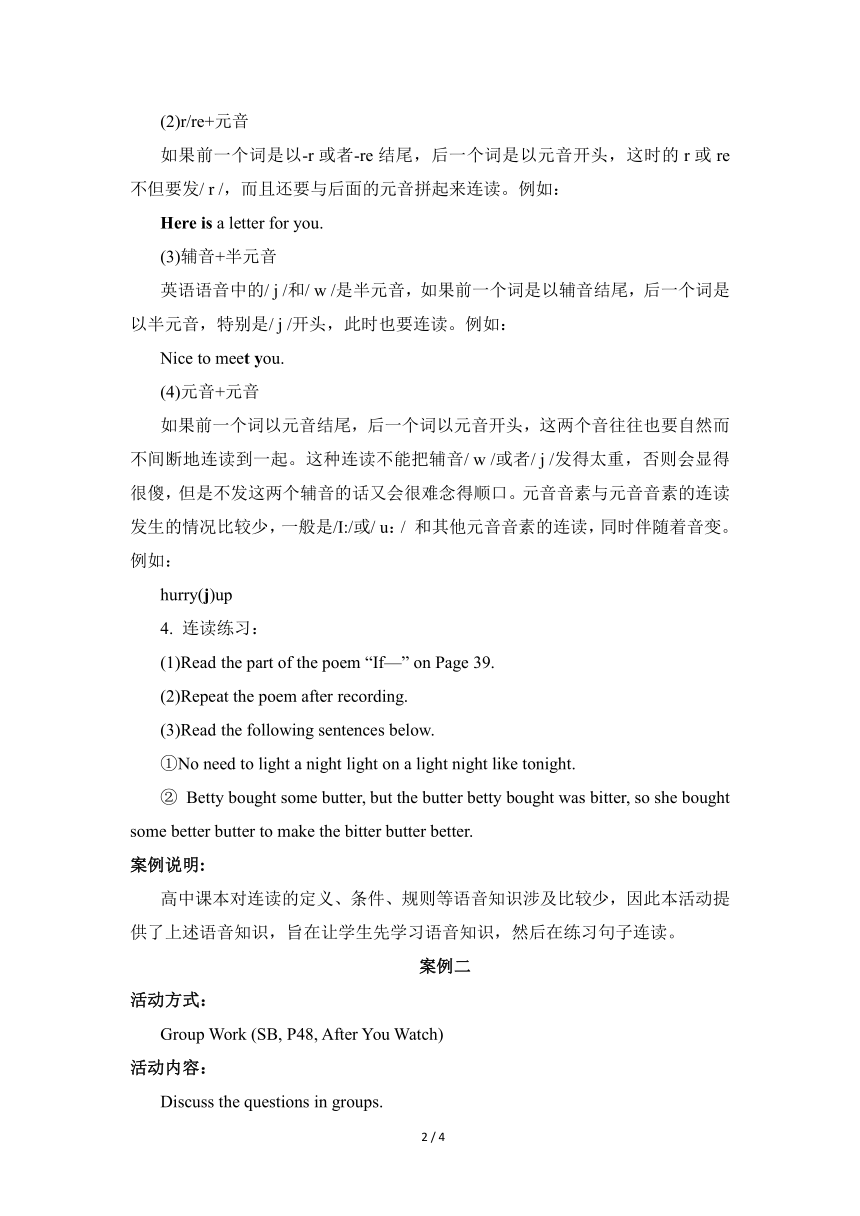人教版(2019)必修第二册 Unit4 History and traditions单元活动设计参考
文档属性
| 名称 | 人教版(2019)必修第二册 Unit4 History and traditions单元活动设计参考 |

|
|
| 格式 | doc | ||
| 文件大小 | 23.6KB | ||
| 资源类型 | 教案 | ||
| 版本资源 | 人教版(2019) | ||
| 科目 | 英语 | ||
| 更新时间 | 2023-03-09 00:00:00 | ||
图片预览


文档简介
Unit4 单元活动设计参考
案例一
活动方式:Class Work (SB,P39,Pronunciation)
活动内容:Read the part of the poem “If—”written by British poet Rudyard Kipling. Notice the linking sounds. Then mark the linking sounds after the model.
学情分析:
高一学生已经学会基本的句子朗读,但是对句子连读还比较欠缺。通过本活动的练习,能够提高学生连读的能力。
教学目标:
1. 认识英语连读的规则。
2. 练习连读,提高连读的能力。
学习活动:
1. 连读的定义:
英语连读是指人们在用英语交谈时,因发音等问题将单词连着读的一种现象。连读的形式有连读和加音,且英语连读有其发音规则。
2. 连读的条件:
(1)相邻的两词在意义上必须密切相关,同属一个意群。连读所构成的音节一般都不重读,只需顺其自然地一带而过,不可读得太重,也不可吞音。
(2)连读现象只出现在意群内部,意群与意群之间的两个相邻单词即使符合上面所讲的两个条件,也不连读。例如: .
I hope it’ll get a little warmer.
这个句子中的hope it就不连读为/hupit/, 因为主句 I hope是一个意群,后面的从句是另一个意群。
3. 连读的规则:
(1)辅音+元音
在同一个意群里,如果相邻两词中的前一个词是以辅音结尾,后一个词是以元音开头,这就要将辅音与元音拼起来连读。例如:
I’m an English boy.
(2)r/re+元音
如果前一个词是以-r或者-re结尾,后一个词是以元音开头,这时的r或re不但要发/ r /,而且还要与后面的元音拼起来连读。例如:
Here is a letter for you.
(3)辅音+半元音
英语语音中的/ j /和/ w /是半元音,如果前一个词是以辅音结尾,后一个词是以半元音,特别是/ j /开头,此时也要连读。例如:
Nice to meet you.
(4)元音+元音
如果前一个词以元音结尾,后一个词以元音开头,这两个音往往也要自然而不间断地连读到一起。这种连读不能把辅音/ w /或者/ j /发得太重,否则会显得很傻,但是不发这两个辅音的话又会很难念得顺口。元音音素与元音音素的连读发生的情况比较少,一般是/I:/或/ u:/ 和其他元音音素的连读,同时伴随着音变。例如:
hurry(j)up
4. 连读练习:
(1)Read the part of the poem “If—” on Page 39.
(2)Repeat the poem after recording.
(3)Read the following sentences below.
①No need to light a night light on a light night like tonight.
② Betty bought some butter, but the butter betty bought was bitter, so she bought some better butter to make the bitter butter better.
案例说明:
高中课本对连读的定义、条件、规则等语音知识涉及比较少,因此本活动提供了上述语音知识,旨在让学生先学习语音知识,然后在练习句子连读。
案例二
活动方式:
Group Work (SB, P48, After You Watch)
活动内容:
Discuss the questions in groups.
1. What historic places in London would you like to visit Why
2. What historic places in your local city would visitors probably like to see most What could you tell visitors about those places and the traditions of your local city
学情分析:
通过观看视频,让学生了解伦敦一些旅游景点的情况,并学习介绍伦敦景点的语言。因此,第一个问题难度不是很大。第二个问题是介绍自己家乡的旅游景点和传统,学生应提前了解家乡的旅游景点和传统的相关常识和背景。
教学目标:
1. 讨论自己要在伦敦参观的景点,并且阐释原因,
2. 向游客介绍自己家乡的景点和文化习俗。
学习活动:
1. 活动准备:
浏览伦敦和学生家乡旅游景点介绍的网站,了解相关信息。
2. 活动过程:
(1)Ask students to search for the Internet and get more specific information about London.
(2)Discuss.
①Ask students to work in groups to discuss what historic places in London they would like to visit and give their reasons.
②Share the answers with the whole class.
③Ask students to go on to work in groups to discuss: What historic places in your local city would visitors probably like to see most What could you tell visitors about those places and the traditions of your local city
④Share the answers with the whole class.
案例说明:
1. 在小组活动中,通过讨论旅游景点,学生能够使用恰当的语言说出景点的名称、描述景点及景点的活动,并说明去该景点的原因。
2. 教师表扬表现优秀的学生,指出活动过程存在的问题,也可以纠正错误的语言。
表扬表现优秀的学生,指出活动过程中存在的问题,纠正错误的语言。
案例一
活动方式:Class Work (SB,P39,Pronunciation)
活动内容:Read the part of the poem “If—”written by British poet Rudyard Kipling. Notice the linking sounds. Then mark the linking sounds after the model.
学情分析:
高一学生已经学会基本的句子朗读,但是对句子连读还比较欠缺。通过本活动的练习,能够提高学生连读的能力。
教学目标:
1. 认识英语连读的规则。
2. 练习连读,提高连读的能力。
学习活动:
1. 连读的定义:
英语连读是指人们在用英语交谈时,因发音等问题将单词连着读的一种现象。连读的形式有连读和加音,且英语连读有其发音规则。
2. 连读的条件:
(1)相邻的两词在意义上必须密切相关,同属一个意群。连读所构成的音节一般都不重读,只需顺其自然地一带而过,不可读得太重,也不可吞音。
(2)连读现象只出现在意群内部,意群与意群之间的两个相邻单词即使符合上面所讲的两个条件,也不连读。例如: .
I hope it’ll get a little warmer.
这个句子中的hope it就不连读为/hupit/, 因为主句 I hope是一个意群,后面的从句是另一个意群。
3. 连读的规则:
(1)辅音+元音
在同一个意群里,如果相邻两词中的前一个词是以辅音结尾,后一个词是以元音开头,这就要将辅音与元音拼起来连读。例如:
I’m an English boy.
(2)r/re+元音
如果前一个词是以-r或者-re结尾,后一个词是以元音开头,这时的r或re不但要发/ r /,而且还要与后面的元音拼起来连读。例如:
Here is a letter for you.
(3)辅音+半元音
英语语音中的/ j /和/ w /是半元音,如果前一个词是以辅音结尾,后一个词是以半元音,特别是/ j /开头,此时也要连读。例如:
Nice to meet you.
(4)元音+元音
如果前一个词以元音结尾,后一个词以元音开头,这两个音往往也要自然而不间断地连读到一起。这种连读不能把辅音/ w /或者/ j /发得太重,否则会显得很傻,但是不发这两个辅音的话又会很难念得顺口。元音音素与元音音素的连读发生的情况比较少,一般是/I:/或/ u:/ 和其他元音音素的连读,同时伴随着音变。例如:
hurry(j)up
4. 连读练习:
(1)Read the part of the poem “If—” on Page 39.
(2)Repeat the poem after recording.
(3)Read the following sentences below.
①No need to light a night light on a light night like tonight.
② Betty bought some butter, but the butter betty bought was bitter, so she bought some better butter to make the bitter butter better.
案例说明:
高中课本对连读的定义、条件、规则等语音知识涉及比较少,因此本活动提供了上述语音知识,旨在让学生先学习语音知识,然后在练习句子连读。
案例二
活动方式:
Group Work (SB, P48, After You Watch)
活动内容:
Discuss the questions in groups.
1. What historic places in London would you like to visit Why
2. What historic places in your local city would visitors probably like to see most What could you tell visitors about those places and the traditions of your local city
学情分析:
通过观看视频,让学生了解伦敦一些旅游景点的情况,并学习介绍伦敦景点的语言。因此,第一个问题难度不是很大。第二个问题是介绍自己家乡的旅游景点和传统,学生应提前了解家乡的旅游景点和传统的相关常识和背景。
教学目标:
1. 讨论自己要在伦敦参观的景点,并且阐释原因,
2. 向游客介绍自己家乡的景点和文化习俗。
学习活动:
1. 活动准备:
浏览伦敦和学生家乡旅游景点介绍的网站,了解相关信息。
2. 活动过程:
(1)Ask students to search for the Internet and get more specific information about London.
(2)Discuss.
①Ask students to work in groups to discuss what historic places in London they would like to visit and give their reasons.
②Share the answers with the whole class.
③Ask students to go on to work in groups to discuss: What historic places in your local city would visitors probably like to see most What could you tell visitors about those places and the traditions of your local city
④Share the answers with the whole class.
案例说明:
1. 在小组活动中,通过讨论旅游景点,学生能够使用恰当的语言说出景点的名称、描述景点及景点的活动,并说明去该景点的原因。
2. 教师表扬表现优秀的学生,指出活动过程存在的问题,也可以纠正错误的语言。
表扬表现优秀的学生,指出活动过程中存在的问题,纠正错误的语言。
